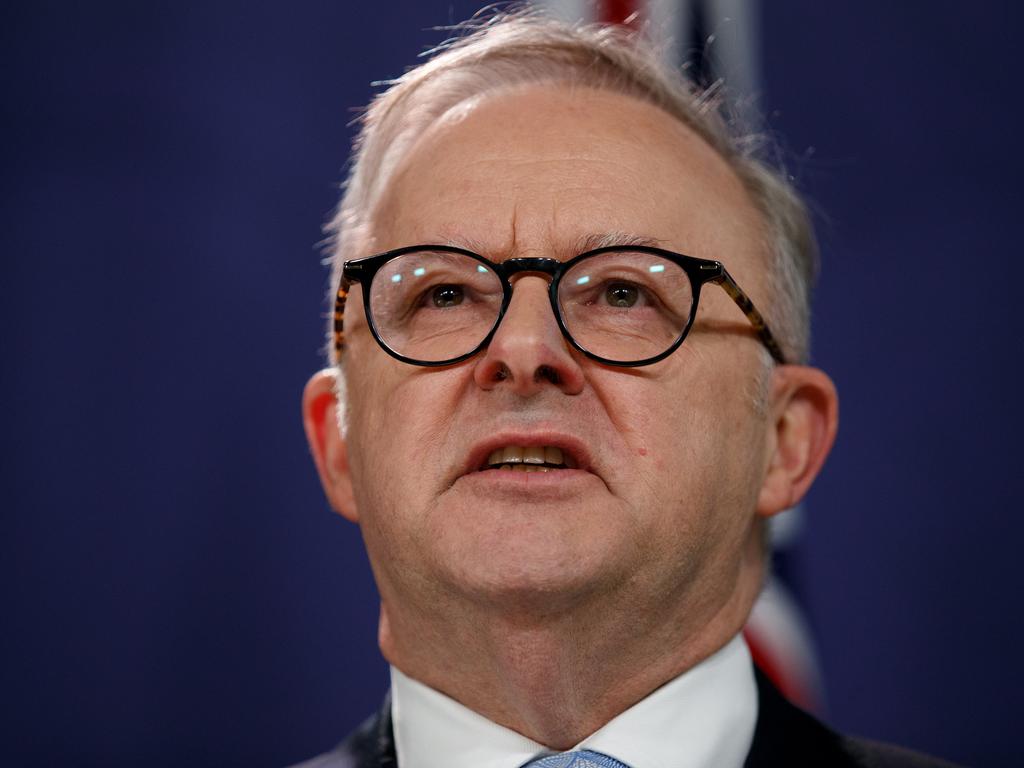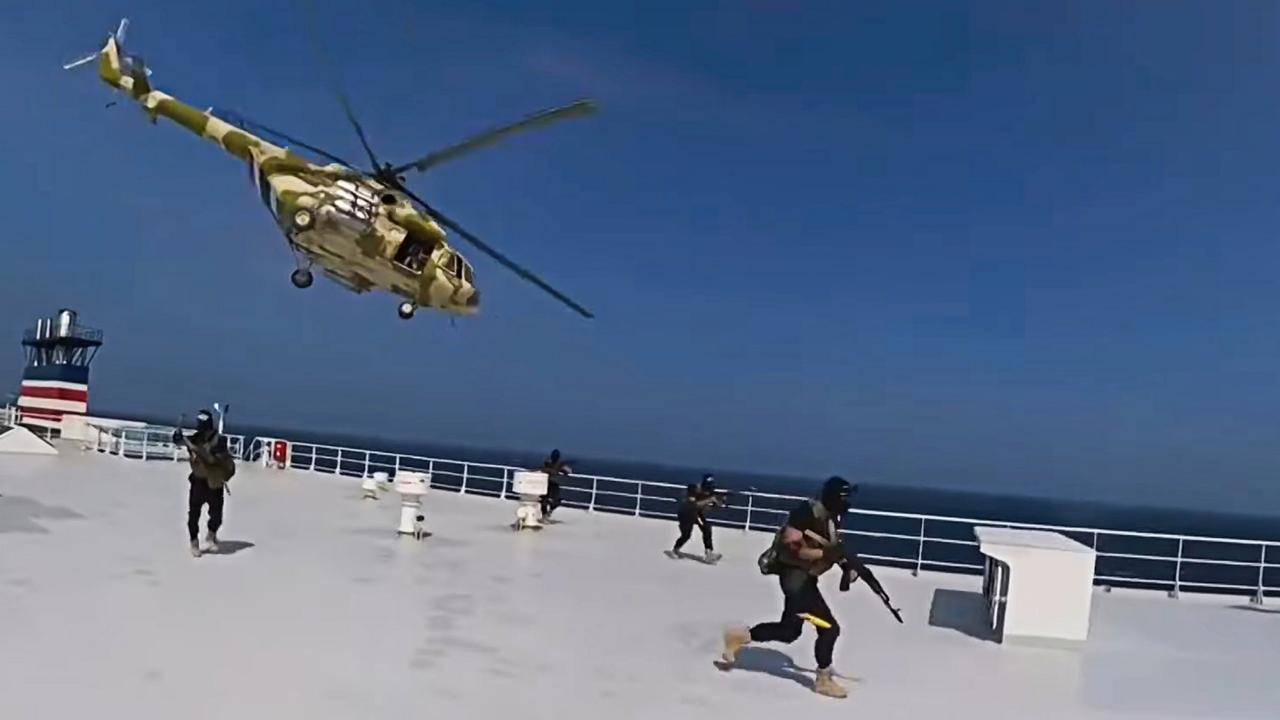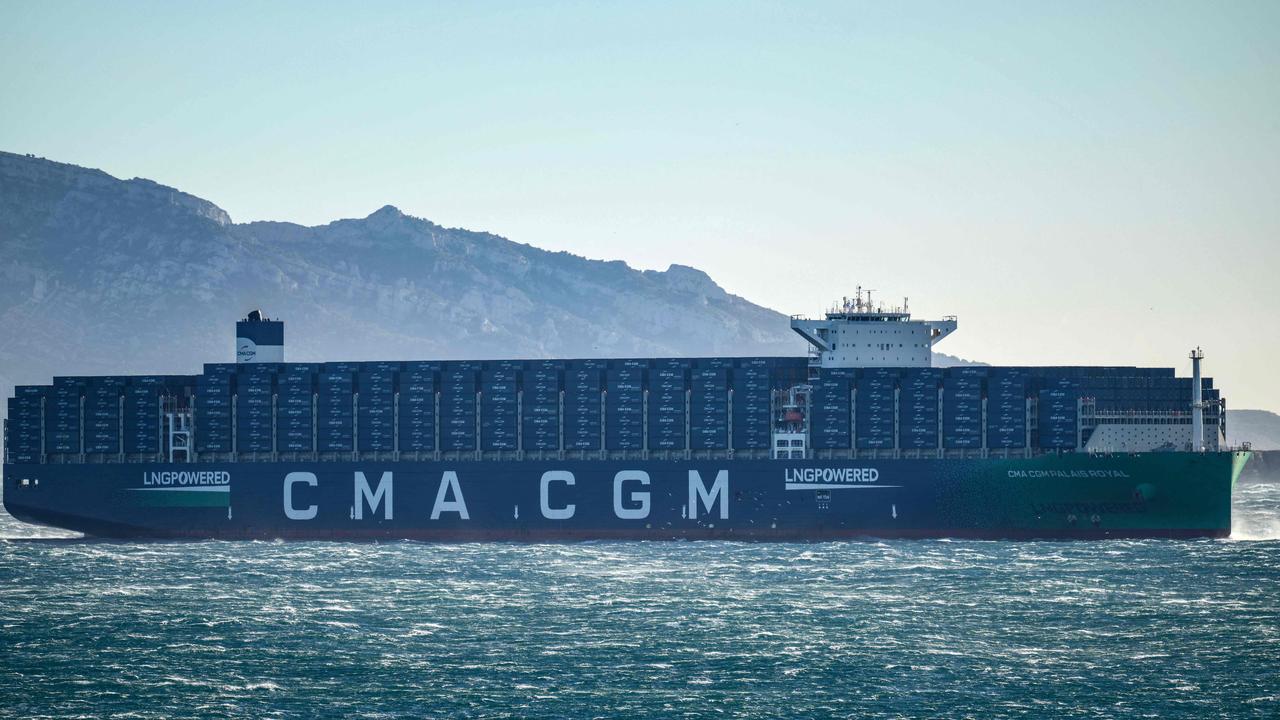Houthi Red Sea attacks expose Australia’s extreme weakness
Horrifying attacks a world away could throw a major element of Australia’s economy into chaos - and the government isn’t getting stuck in to help.
ANALYSIS
A stuck ship blocked the Suez Canal for six days. A lack of rain has slowed the Panama Canal to a crawl for months. Now a Middle Eastern war threatens to up-end the world’s incredibly efficient – but immensely fragile – “just in time” trade networks.
And Australia can’t do anything about it.
But the global disruption to shipping caused by the Houthi jihadist attacks on vessels passing through the Gate of Tears (Bab-el-Mandab Strait) is just a taste of things to come.
About 80 per cent of all global trade is carried by ocean-going vessels.
For Australia, that figure is 99.93 per cent.
These massive pick-up-and-delivery ships follow a circuit of ports on rigid timetables. And if they’re late, the flow-on effects can be dramatic.
The world has experienced this before.
In 1988, the Royal Australian Navy (RAN) had about nine warships suited to make an 880km run escorting tankers through the Straits of Hormuz and the Persian Gulf against a threat of missiles, aircraft and mines.
In 2023, it has only three it can confidently say have the world-standard capability to shepherd container ships through the Gate of Tears and into the 2250km Red Sea amid a threat of drones, cruise missiles, ballistic missiles and speed boats.
One of these is the air warfare frigate HMAS Brisbane, which has just returned from a three-month deployment to the Pacific. The remaining two aren’t ready for sea.
“Our resources have been prioritised in our region, the Indo-Pacific,” Prime Minister Anthony Albanese told reporters Wednesday. “We’ve played an important role in freedom of navigation in the South China Sea and the operations that we’re conducting as well with the Philippines.”

That’s because any clash between Beijing and the Philippines – or Taiwan, Japan, Vietnam, Malaysia, or Indonesia – threatens far greater economic fallout for Australia than the Red Sea.
“Joining a multinational taskforce to protect shipping lanes and the principle of freedom of navigation would clearly be in Australia’s interest,” argues Australian Strategic Policy Institute (ASPI) analyst Dr Malcolm Davis.
“We would call for such multinational action if attacks occurred in our region.
“And if potential threats in the Indo-Pacific are so serious that Australia can’t afford to provide a single ship to the Red Sea task force, that might suggest that the messaging about the situation in the Indo-Pacific underplays the reality, including Beijing’s bullying and intimidation of countries like the Philippines.”
The peace dividend
The global economy exists only because of the relative peace of the past 80 years.
Since the end of World War II, even the Cold War with Russia rarely upset the shipping lanes. And that promoted the rapid growth of international trade.
Now, almost every Australian job is built on the back of an ability to move goods around the world at immensely low cost in a clockwork rhythm of loading, travelling and offloading.
An average modern cargo ship is 400m long and can carry 10,000 standardised containers. The largest carry 20,000.
One of these containers could be holding your next phone. Others could be carrying your replacement light bulb, office chair and bottle of scotch. Not to mention half the packaged food items in your supermarket’s aisles.
Even the makers of Australian products like satellites, warships, houses and furniture depend on mass deliveries of intermediate materials and products – such as fuel, silicon chips, actuators, motors, batteries – and even cut steel.
Meanwhile, other ships will be hauling bulk unprocessed Australian lithium, iron, aluminium, copper, gas, wheat, fish and so on so other nations can manufacture them into those same products.
All these eggs are bundled into such enormous baskets taking different paths to their destinations because it’s efficient – and safe – to do so.
But it’s not as safe as it was.
“The world can no longer be easily compartmentalised into Europe, the Middle East and the Pacific,” says Dr Davis. “The global impacts of both the Israel–Hamas war and Russia’s war on Ukraine clearly show this.”
And the delays are mounting up.
“Some ships have been diverted around Africa’s Cape of Good Hope — adding significant delays and costs. For example, voyages to Europe could be extended by up to two weeks, raising fuel and operating costs as well as delay costs for exporters, importers, and end users,” says The Atlantic Council’s Hung Tran.
Economies of scale
Why have the world’s shipping companies put all their eggs in so few baskets?
It’s been safe to do so.
One huge ship doesn’t need many more crew than an average one. And doubling its size only increases the fuel bill by about 25 per cent – at least at speeds of about 20 knots (37 km/h).
The upshot is it’s 80 per cent cheaper to carry 20,000 containers in one monstrous vessel than the 20 ships needed to do the same in the 1970s.
What does that mean?
It now costs roughly $1700 to move any given standard shipping container halfway around the world. One of those containers can carry 8000 shoe boxes. So transport adds just 21c to the price of a pair of shoes in an Australian store.
But take away safety, and that extreme efficiency suddenly becomes a serious problem.
Everything falls apart. Especially for insurers.
“Oil and gas prices have already jumped following news of the attacks,” says Tran. “Shipping insurance premiums have nearly doubled for some carriers over the past week.”

We’ve seen this before.
The Iran-Iraq War spilled over into the Persian Gulf in 1988. About 300 ships were damaged by missiles, bombs and mines. About a dozen sank.
International insurance companies hadn’t set aside cash reserves for a war involving shipping. And the damage bill quickly bled them dry.
Attempts to offset that cost saw car, household, health – all forms of insurance, soar worldwide.
Only the rapid intervention of the US Navy and a global coalition of warships (including Australia) – along with the US government backing rapidly re-flagged US tankers – prevented a global financial meltdown.
But times have changed.
The US Navy is half the size it was at the culmination of the Cold War with Soviet Russia.
And the container ships of the 1980s carried an average of 3000 containers. Likewise, the era’s bulk oil and fuel carriers were similarly smaller than they are now.
The Gate of Tears
“Australia signed a joint statement condemning the Houthi attacks and, as a maritime nation that has long understood the importance of unencumbered sea lanes, there was a reasonable expectation that it would send a warship to join the task force,” argues Davis.
The Strait of Hormuz is a chokepoint for about one-fifth of the world’s total oil supply.
The Red Sea – with the Suez Canal at one end and the Gate of Tears at the other – carries about 12 per cent of global trade.
For the South China Sea, that number soars to 33 per cent.

All three are tinderboxes of international tensions as an “Axis of Authoritarians” involving China, Russia, and Iran attempt to impose their own New World Disorder on their neighbours.
“A failure to respond (to the Houthis) would not only imperil global trade but also weaken a rules-based order already under attack from authoritarian states, with Iran a key belligerent,” warns Dr Davis.
“Australia cannot seek immunity through inaction. And we can’t expect support for stability and security in the Indo-Pacific from our American and European partners if we leave the rest of the world to others.”
Earlier this week, the US announced an international security effort dubbed Operation Prosperity Guardian that listed the UK, Bahrain, Canada, France, Italy, the Netherlands, Norway and the Seychelles as coalition members.
Spain and Australia – two nations with the capability to help – declined.
But driving the coalitions’ efforts are economic fears.
“While the Israel-Hamas war has not yet had an impact on energy prices, the disruption in the Red Sea might,” says Hung. “Rising oil and gas prices would keep headline inflation high, complicating central banks’ efforts to pivot to easing.”
For Australia, decades of defence procurement disasters are coming home to roost – with scandal, delay and indecision over a new generation of frigates set to make matters worse.
“The navy has assured the government it can deploy a warship to the Red Sea if asked to,” says Dr Davis. “But any deployment would require rotations of ships and crews, placing additional strain on the navy’s readiness for other tasks.
“If the decision not to deploy a ship to the taskforce is based on concerns about Australia’s fleet size and readiness, then a larger and more powerful navy is clearly needed to respond to the growing risks within our area of primary strategic interest and, if necessary, beyond.”
Jamie Seidel is a freelance writer | @JamieSeidel






